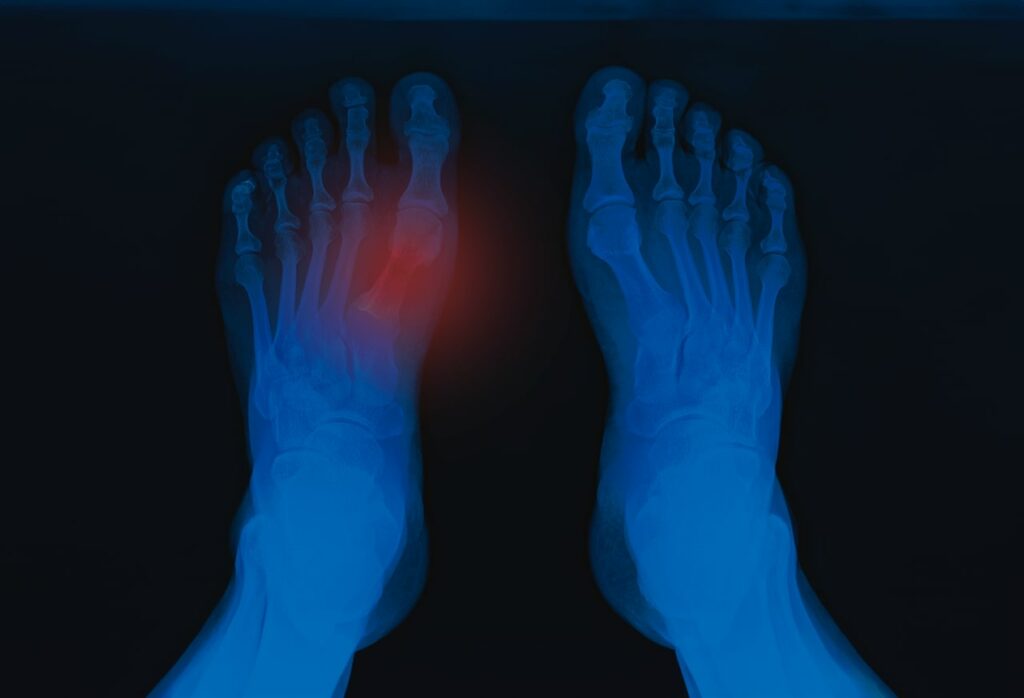Hyperuricemia is a metabolic disorder that is increasingly common in the general population, and its importance lies in the complications it can trigger if not properly diagnosed or treated.
What is hyperuricemia
Hyperuricemia is defined as an abnormal increase in uric acid levels in the blood, generally above 6.8 mg/dL (milligrams per deciliter).
Uric acid is an end product of purine metabolism, a compound found in certain foods and body tissues.
Normally, uric acid is eliminated through urine, but when there is an imbalance between its production and elimination, blood levels increase.
Among the most common causes of hyperuricemia are:
- Excess production: may occur due to diets rich in purines such as red meat, seafood, and alcohol, or as a result of conditions such as chemotherapy that rapidly destroy cells, releasing purines into the bloodstream.
- Poor elimination: associated with kidney disease and the use of certain medications such as diuretics; some metabolic disorders can also cause it.
- Genetic factors: hereditary predisposition to hyperuricemia exists due to enzymatic or renal alterations.
Uric acid, symptoms
It is common for a person with hyperuricemia not to have obvious symptoms, which is why it is often considered an asymptomatic condition. However, in some cases, high uric acid levels can lead to various health problems if not controlled:
- Gout: the most well-known clinical manifestation of hyperuricemia, occurring when monosodium urate crystals deposit in the joints, causing inflammation and intense pain. It is very common in the big toe but can also affect the ankles, knees, hands, and elbows.
- Nephrolithiasis: the accumulation of crystals in the urinary system can form kidney stones, causing lumbar pain, hematuria or blood in urine, and urinary obstruction.
- Kidney damage: chronic hyperuricemia may contribute to worsening kidney function, aggravating pre-existing conditions such as kidney failure.
- Skin manifestations: in severe cases, gouty tophi may form, which are masses of uric acid crystals visible under the skin, usually deposited around the joints or in the soft tissues.
- General discomfort: fatigue, low-grade fever, or a sensation of joint stiffness may be present during acute episodes.
Hyperuricemia treatment
The main goal of hyperuricemia treatment is to reduce uric acid levels in the blood to prevent complications. For this purpose, therapeutic strategies include lifestyle changes, pharmacological management, and, if necessary, treatment of associated complications.
Lifestyle changes involve adopting a balanced diet that limits foods rich in purines and sugary drinks. It is also recommended to increase the intake of fruits, vegetables, and low-fat dairy products to help lower uric acid levels.
Adequate hydration is essential, since drinking enough water promotes the elimination of uric acid through urine and reduces the risk of kidney stone formation.
Avoiding a sedentary lifestyle and controlling body weight are also important measures.
Pharmacological treatment is indicated for patients who have developed symptomatic hyperuricemia or who are at high risk of complications. For this, xanthine oxidase inhibitors are used to reduce uric acid production by inhibiting the enzyme responsible for its synthesis. Uricosuric agents increase the excretion of uric acid by the kidneys, helping to reduce its blood concentration.
During acute gout episodes, anti-inflammatory agents may be used to relieve pain and inflammation.
In more complicated or advanced cases, treatment focuses on addressing each specific condition — for example, removing kidney stones through lithotripsy or surgery, or surgical intervention to prevent deformities caused by tophi.
Regular monitoring is crucial for the management of hyperuricemia, requiring periodic checks of uric acid levels and evaluation of kidney function to adjust treatment according to patient response.
Hyperuricemia is a multifaceted disorder that can remain asymptomatic for long periods of time or may also present with serious complications. If you experience symptoms related to elevated uric acid or have a family history of this condition, it is important to seek specialized medical care to achieve an early diagnosis and appropriate treatment.
At the ABC Medical Center’s Internal Medicine Department, we can provide you with specialized care. Contact us!
Fuentes
MedlinePlus, Cigna, MSD Manuals



